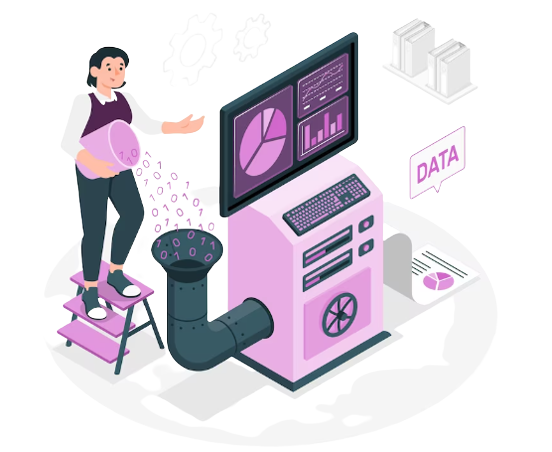As the world becomes more data-driven, the future of big data is sure to be exciting and full of opportunities. Whether you’re a business owner, data scientist, or simply someone interested in the field, staying informed and adaptable will be key to success in the years to come.
The explosion of data in recent years has created a massive demand for big data technologies and expertise. Big data has become a key strategic asset for businesses and governments alike, enabling them to extract insights and make data-driven decisions. As we enter 2023, the big data landscape is evolving rapidly, with new trends and innovations emerging. In this blog post, we will explore some of the key predictions and trends for the future of big data.

Artificial Intelligence and Machine Learning
Artificial Intelligence (AI) and Machine Learning (ML) are increasingly being used to analyze big data and extract insights. In the coming years, we can expect AI and ML to become even more advanced, with the ability to automate complex tasks and decision-making processes. This will enable businesses to achieve greater efficiency and accuracy in their operations.
Cloud Computing and Edge Computing
The adoption of cloud computing has been a major driver of the big data revolution, and this trend is expected to continue in the coming years. However, there is also a growing interest in edge computing, which involves processing data closer to where it is generated, rather than in centralized data centers. This approach can help reduce latency and improve performance for real-time applications.
Privacy and Security
As big data continues to grow in importance, privacy and security will remain major concerns. Data breaches and cyber attacks can have severe consequences for businesses and individuals alike. In the coming years, we can expect to see more emphasis on data privacy and security, with increased regulation and the adoption of new technologies such as blockchain.
Data Ethics
With the increasing importance of big data, there is also a growing awareness of the ethical implications of data use. This includes issues such as bias, fairness, and transparency. As a result, we can expect to see more emphasis on data ethics in the coming years, with businesses and governments adopting ethical frameworks and guidelines.
Data Visualization
Data visualization is an important tool for making complex data more accessible and understandable. In the future, we can expect to see more emphasis on data visualization, with the development of new tools and technologies that make it easier to create and share visualizations.
Natural Language Processing
Natural Language Processing (NLP) is a technology that enables computers to understand and interpret human language. In the coming years, we can expect to see more emphasis on NLP. With the development of new applications that enable businesses to analyze unstructured data such as text and voice.
Data Governance
Data governance refers to the management of data assets, including policies, procedures, and standards for data use. As big data continues to grow in importance, data governance will become increasingly important, with businesses and governments adopting best practices and standards for data management.
Data Democratization
Data democratization refers to the process of making data more accessible to a wider range of people within an organization. This involves breaking down data silos and providing access to data for non-technical users. In the coming years, we can expect to see more emphasis on data democratization, with the development of new tools and technologies. That enables non-technical users to access and analyze data.
Conclusion:
In conclusion, big data is a rapidly evolving field, with new technologies and trends emerging all the time. By staying up-to-date with the latest developments and adopting best practices for data management, businesses can unlock the full potential of big data and gain a competitive advantage. From artificial intelligence & machine learning to cloud computing & data ethics, there is a lot to keep an eye on when it comes to the future of big data. While we can’t predict exactly what will happen in the coming years. It’s clear that the importance of data will only continue to grow. And businesses that can harness the power of data will be the ones that thrive.
By understanding the trends and predictions outlined in this post, businesses can start preparing for the future of big data today. This means investing in the right tools and technologies, hiring skilled data professionals, and prioritizing data ethics and security.
As the world becomes more data-driven, the future of big data is sure to be exciting and full of opportunities. Whether you’re a business owner, data scientist, or simply someone interested in the field, staying informed and adaptable will be key to success in the years to come.
BACK










